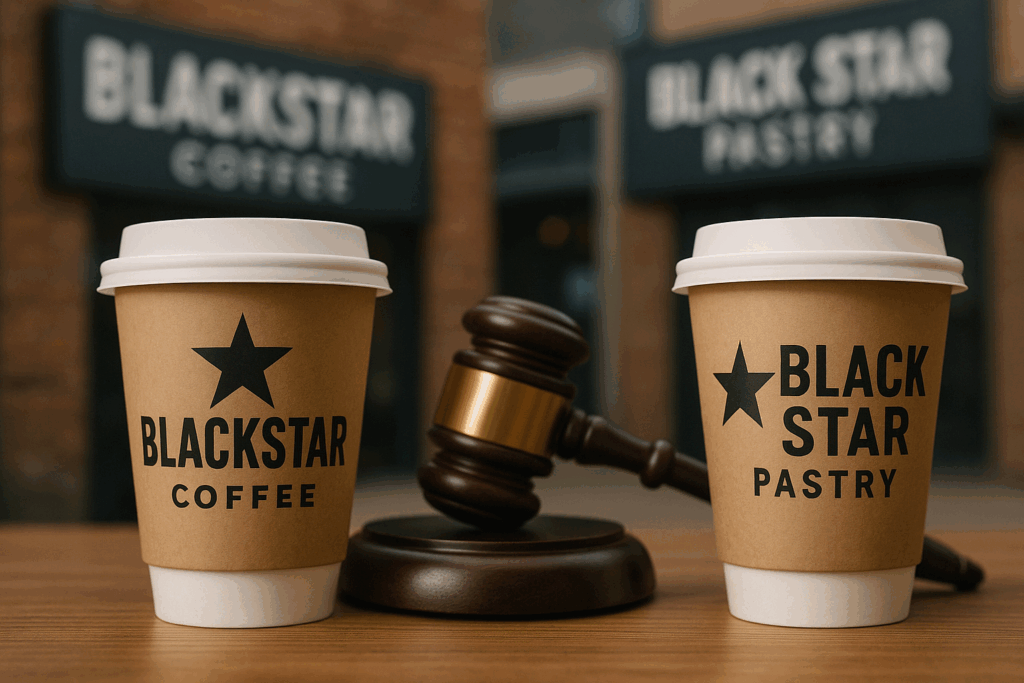Café Conundrum: Black Star Pastry’s Trade Mark Trouble
 Richards v Black Star Pastry Pty Ltd (No 2) [2025] FedCFamC2G 1226 is a cautionary tale in brand coexistence gone wrong — where parallel growth by two businesses using similar names eventually led to a Federal Circuit and Family Court stoush over coffee, cakes and trade mark rights.
Richards v Black Star Pastry Pty Ltd (No 2) [2025] FedCFamC2G 1226 is a cautionary tale in brand coexistence gone wrong — where parallel growth by two businesses using similar names eventually led to a Federal Circuit and Family Court stoush over coffee, cakes and trade mark rights.
Brewing conflict
Martin Richards and his then-wife started a Brisbane-based social enterprise in 2007 called Blackstar Coffee, roasting beans and selling espresso from carts and cafés. He registered the word mark BLACKSTAR in 2007 and a composite BLACKSTAR COFFEE mark in 2009, covering coffee, coffee beverages and related goods.
Unbeknownst to him at the time, pastry chef Christopher Thé opened a bakery in Newtown, Sydney in 2008 under the name Black Star Pastry — complete with its now-famous strawberry watermelon cake and a reputation that soon spread globally (and virally). Thé registered Black Star Pastry as a business name in 2008 and eventually incorporated Black Star Pastry Pty Ltd (BSP) in 2011.
Though Richards became aware of the Sydney business around 2011 and made contact with Thé, no formal resolution followed. Over the next decade, BSP grew into a multi-store operation in NSW and Victoria, increasingly offering café services and coffee beverages — areas overlapping with Blackstar Coffee’s core trade mark rights.
Trade marks collide
The dispute centred on whether BSP’s use of the phrase BLACK STAR PASTRY — including in logos and retail branding — infringed Richards’ earlier BLACKSTAR marks.
BSP argued that:
-
Its core business was bakery, not coffee;
-
The term Black Star Pastry was distinguishable;
-
Its trade marks had been accepted and registered by IP Australia after amending the specification to exclude “café services” and “specialty coffee retailing”;
-
Any coffee sales were ancillary or covered by its own “bakery services” registrations;
-
Richards had acquiesced by failing to object earlier.
Richards, meanwhile, argued that BSP:
-
Was selling coffee and operating cafés under the Black Star Pastry name;
-
Was using the sign as a trade mark in relation to goods and services covered or closely related to his registrations;
-
Was likely to cause consumer confusion;
-
Couldn’t rely on s 122(1)(e) as a defence because coffee wasn’t squarely within BSP’s registered bakery services;
-
Should not benefit from any perceived delay in enforcement.
The Court’s blend
Judge Manousaridis found in favour of Richards on the infringement claim. The key findings:
-
BSP was using BLACK STAR PASTRY as a trade mark for both coffee and café services.
-
These services were either directly covered by or closely related to the BLACKSTAR registrations.
-
The marks were deceptively similar — particularly given the visual and phonetic similarity, the shared “Black Star” element, and the use in closely related contexts (coffee and cafés).
-
BSP could not rely on its own trade mark registrations as a defence under s 122(1)(e) — because those registrations expressly excluded coffee retailing and café services.
-
Richards’ prior knowledge and phone call with Thé did not amount to acquiescence or delay sufficient to bar relief.
Takeaways: more than just crumbs
This decision serves up some useful reminders:
-
Clearance is key: Registering a business name doesn’t grant trade mark rights — and failing to conduct proper searches can be costly a decade down the line.
-
Expansion needs a check-up: A pivot or expansion into adjacent services (like coffee within a bakery) may breach earlier rights, even if your mark was initially registrable with exclusions.
-
Acquiescence isn’t easily made out: A polite phone call in 2011 won’t shield years of brand growth from an infringement claim — especially when the overlap intensifies over time.
-
Name components matter: While Black Star Pastry and Blackstar Coffee may sound just different enough to lawyers, the average café-goer isn’t parsing the spacing.
In the café world, Black Star may once have stood for two different brands in two different cities — but as the beans (and cakes) spread, the law says one star had to fall.